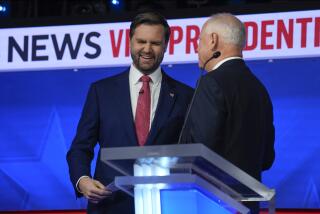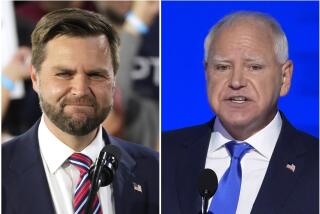Timing Tells Most When Choosing a Running Mate
- Share via
WASHINGTON — The lesson of New Orleans is: Campaigns run risks when TV dictates strategy. After ABC’s Roone Arledge pronounced the Democratic Convention in Atlanta a ratings bomb and statistics showed record high rentals at video outlets, the Bush campaign became preoccupied with elevating its audience-share for the Republican Convention.
That led to George Bush’s major mistake in announcing Sen. Dan Quayle of Indiana as his running mate: timing. The idea behind postponing the vice presidential announcement until the final day of the convention was to build suspense. Suspense, in turn, was supposed to build audience-share. As a tactic, it might have worked well, provided the vice presidential choice was a well-known candidate like Rep. Jack Kemp of New York or Sen. Bob Dole of Kansas.
But throwing out the name of a little-known junior senator from Indiana to thousands of reporters gathered in New Orleans, each in a frenzy of fear that someone else would get the scoop on the vice presidential choice, was like tossing a match into a roomful of gas.
Rumors spread fast in crowds, like the 1980 election rumor--meant to highlight the “age issue”--that Ronald Reagan had suffered a heart attack. That rumor spread on the floor of the New York stock exchange and made radio network news.
Lately it’s become tough to find the right formula for choosing a vice president. In 1984 Walter F. Mondale tried the “veepstakes” interviews at his home in Minnesota, conspicuously interviewing candidates who appealed to all factions of the party. The press pronounced the process demeaning. Reagan, in 1980, delayed his choice until debilitating rumors about a “co-presidency” with Gerald R. Ford made him look weak. Michael S. Dukakis has come closest to doing it right--with the exception of failing to notify Jesse Jackson. The key elements are to preserve the dignity of contenders, announce the choice early enough to let the press focus on the nominee without detracting from the convention and get any ugly issues surrounding the candidate out of the way during a week when no other key campaign events are planned.
Now that the National Guard issue, Paula Parkinson and law school records are out of the way, the only thing left with which to roast Quayle is experience. Is a 41-year-old ready to be a heartbeat away from the presidency?
Here it’s instructive to look at our most recent young president--John F. Kennedy. Kennedy had eight years in the Senate when he ran in 1960. Quayle has eight years in the Senate in 1988.
As a senator, Kennedy’s only major legislative accomplishment was a labor reform bill aimed at racketeering, the Kennedy-Ervin bill of 1958. It passed the Senate 92-1, but was not enacted into law.
Quayle can lay claim to co-sponsorship--along with Sen. Edward M. Kennedy (D-Mass.)--of the Job Partnership and Training Act of 1983, legislation that replaced the inefficient CETA program. Quayle’s role on the Armed Services and Labor and Human Resources committees gives him a dual command of defense and domestic policy. He was the author of defense procurement reform bills and was a proponent of tax reform even before Ronald Reagan.
What remains important, for a man who may be a heartbeat away from the Oval Office, is to show presidential timber. Here Quayle’s Vietnam-era service as a public-affairs officer in the National Guard has been belittled. How quickly we forget that public affairs is also a military duty. Dwight D. Eisenhower was a speech writer for Gen. Douglas MacArthur before he had command responsibilities. Quayle should not get hung up on this. If he demonstrates, on the stump, that he has the right stuff for leadership he may yet be an asset to the ticket.
Quayle has already helped Bush. By sticking with his nominee through a media grilling, Bush has shown he is no wimp. Attention to the National Guard issue has elevated Bush’s stature as a combat veteran through intensive media exposure, and allowed the Bush team to emphasize one of Dukakis’ weak spots--his liberal stance on defense and foreign policy. It was a rough beginning, but by hanging tough, Bush and Quayle have emerged standing tall, putting the GOP ticket in a competitive position when the campaign begins in earnest after Labor Day. Given where he stood in the polls in July, that is all Bush could have wished.
More to Read
Get the L.A. Times Politics newsletter
Deeply reported insights into legislation, politics and policy from Sacramento, Washington and beyond. In your inbox twice per week.
You may occasionally receive promotional content from the Los Angeles Times.










